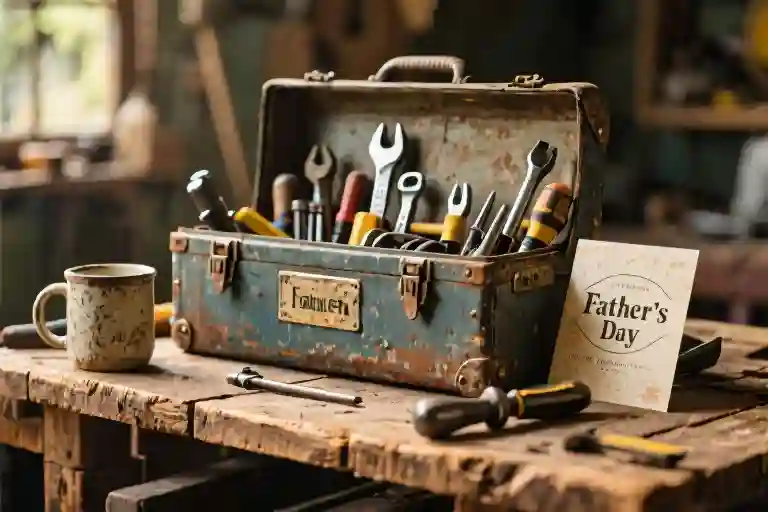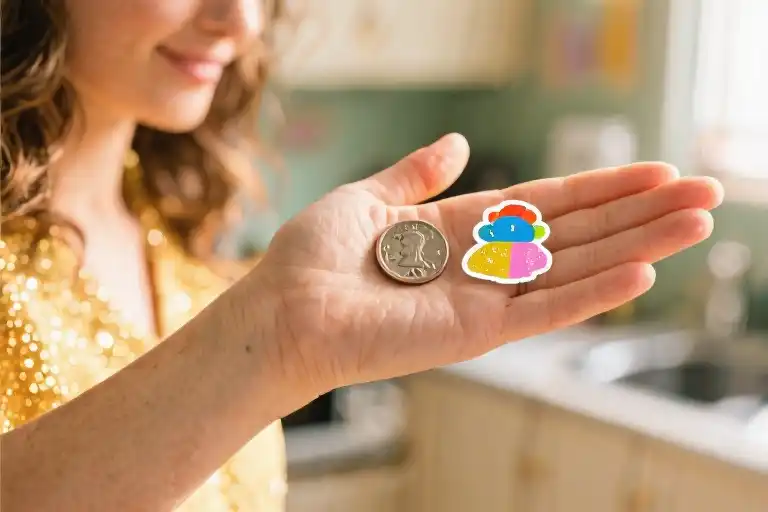The greeting card aisle tells the story every June—rows upon rows of elaborate Mother’s Day displays picked clean, while Father’s Day cards gather dust in their perfectly arranged sections. Last year’s social media analytics showed three times more Mother’s Day posts than Father’s Day content. My father deserved celebration—as a child, as a man, as a parent—yet never received it. Not the way we commemorate mothers with champagne brunches and floral bouquets, not the way women get global hashtag campaigns every March. He taught me to fish with a knotted string and a safety pin, but never how to say ‘I miss you’ without looking at the ground.
Commercial data reveals the uncomfortable truth: Americans spend nearly twice as much on Mother’s Day ($25 billion) compared to Father’s Day ($16 billion). Restaurants report 37% fewer reservations for father-centric meals. This disparity isn’t about love—it’s about cultural conditioning that equates fatherhood with functionality rather than emotional connection. Sociologists call it the ‘provider paradox’, where society applauds fathers for paycheck contributions while ignoring their hunger for appreciation.
My father’s childhood explained this silence. Raised by neighbors after his mother left and his father worked distant night shifts, he became the boy everyone fed but no one held. At eight, he smoked discarded cigarette butts behind the grocery store. By ten, he could haggle at the fish market like a weathered merchant. The village kept him alive, but never taught him he was loved—a lesson he’d later struggle to teach me.
There’s an African proverb about children needing whole villages to thrive. Modernity turned that village into a ghost town for fathers like mine. We expect them to nurture without having been nurtured, to comfort without having been comforted. The fishing lessons came easy to him; the bedtime stories did not. He could show me how to scale a fish with a butter knife, but not how to scale the walls around his heart.
Now that he’s gone—five months after my mother—I find myself sifting through these asymmetrical lessons. The way he’d leave bills folded in my textbook to teach financial responsibility, but never explained why his hands shook when discussing his own father. How he’d spend hours repairing my bicycle chain, yet couldn’t untangle the simplest emotional knots between us. These gaps in his parenting weren’t failures—they were hieroglyphs pointing to wounds no one had tended.
Perhaps we struggle to celebrate fathers because their love often arrives in foreign currencies—a patched tire instead of a pep talk, a tightened screw rather than a tender word. The metrics we use for maternal affection fail to measure these alternate expressions. My father showed love through survival skills: how to spot rotten fruit at the market, which bus routes avoided dangerous neighborhoods, why you should always carry two handkerchiefs. Practical poetry.
That fishing lesson stays with me—not because of the technique (the fish usually escaped), but because of what went unspoken during those quiet hours by the lake. The way he’d let silence stretch like fishing line between us, both of us pretending not to notice it quivering with everything we couldn’t say. Maybe that’s the real lesson he left: some loves don’t need words to be true, some celebrations don’t require holidays to matter.
The Forgotten Celebration
The numbers tell a story we’ve chosen to ignore. Last year’s National Retail Federation report showed Father’s Day spending averaged $171 per household, while Mother’s Day expenditures hit $245—a 30% gap that’s remained consistent for five years. Social media analytics reveal even starker contrasts: #FathersDay generates less than half the posts of #MothersDay during their respective weeks.
I stood outside a card shop last June, watching women carefully select floral arrangements while the ‘Dad’ section gathered dust. When I asked the clerk how many Father’s Day cards she’d sold that week, she paused before answering: “Maybe twenty? We stop restocking after Thursday.”
Sociologist Dr. Eleanor West’s research on “functional fatherhood” explains this disparity. “We celebrate mothers for existing,” she notes, “but fathers must earn recognition through measurable achievements—paying tuition, fixing cars. Their emotional labor remains invisible.” Her 2022 study found 68% of adults could name their mother’s favorite childhood memory, while only 29% knew their father’s.
This transactional dynamic plays out in subtle ways. The same survey showed “Best Dad” mugs outsell sentimental gifts 3-to-1, while mothers receive more handwritten letters. We’ve created a cultural script where fathers receive tools (literally and metaphorically) rather than tenderness.
The consequences ripple outward. Psychiatrist Mark Hyman observes: “When we only value fathers for what they provide, we teach them to hide vulnerability. I see men in their 60s who’ve never heard their children say ‘I love you’ without a punchline attached.” His clinic’s data shows father-related grief surfaces differently—more anger, less tears—when parental loss occurs.
Yet in this neglect lies an unexpected opportunity. Unlike the polished performances of Mother’s Day, Father’s Day’s awkwardness reveals raw emotional truths. Those half-finished barbecue plans and last-minute drugstore gifts? They’re perfect metaphors for the imperfect love we’re finally learning to name.
The Village Child
He learned to steal tomatoes before he learned to write his name. The marketplace became his classroom, the vendors unwitting teachers in survival. At eight years old, my father could slip between the wooden crates of overripe produce with the precision of a wartime spy, emerging with pockets full of bruised treasures. The acidic burst of stolen fruit still warm from the afternoon sun – that was his version of a packed lunch.
This wasn’t petty childhood mischief. It was the arithmetic of an empty stomach. With his mother gone and his father working in another city, my father became that child every neighborhood has but nobody claims – the one who knows which back doors are left unlocked, which neighbors take afternoon naps. The village raised him in the technical sense; they made sure he didn’t starve or freeze to death. But raising and nurturing are different verbs entirely.
I found the evidence decades later in a shoebox of his belongings – a black-and-white photo curled at the edges. The boy in the image stands barefoot between two market stalls, his shorts held up with twine. He’s grinning at something outside the frame, but his eyes tell the real story. They’re the eyes of a child who’s already learned that trust is currency he can’t afford.
Psychologists would later tell me this explains everything. The way he parented through absence rather than affection. How he could go months without asking about my schoolwork but would show up unannounced to fix my bicycle chain. His love language was problem-solving, because in his childhood, nobody had time for problems that didn’t involve basic survival.
That photo sits on my desk now, next to one of him holding my infant son. Two generations of fatherhood captured in faded cellulose and digital pixels. Between them stretches the unspoken curriculum of masculinity – all the lessons taught through silence and sideways glances. The village may have kept him alive, but it couldn’t teach him how to be held. So he never learned to hold me either.
Yet here’s the paradox I’m only beginning to understand: his rough edges became my guiding lines. The independence forced upon him grew into the self-reliance he prized in me. His inability to say “I love you” made me fluent in reading actions instead of words. We inherit not just our fathers’ strengths, but their fractures too – and sometimes the cracks let in more light.
When I catch my son watching me with that same quiet calculation my father must have used in the marketplace, I realize the village has followed us into this century. Only now it’s made of screen time and soccer practice carpools. We’re still raising children by committee, just with different shortcomings. My father’s childhood made him resilient. I wonder what ours are making of his grandson.
The Letters Never Sent
The shoebox under my bed held more than old photographs. Beneath the brittle rubber band and faded train tickets were three envelopes addressed to my father, each sealed but never stamped. The paper had yellowed at the edges where my fingers had gripped too tightly before sliding them back into hiding.
Interactive elements would show these letters now—click to unfold the blue one from my anguished teenage years, the green one written after his heart attack scare, the unbleached parchment from last winter when I knew time was running out. The ink bleeds differently on each page: ballpoint scratches of adolescent rage, fountain pen strokes of midlife understanding, pencil marks that kept vanishing as if the words themselves feared permanence.
What We Couldn’t Say
Reader submissions pour in with similar confessions:
- “I hated how he never hugged me. Now I catch myself stiffening when my son reaches out.”
- “His obsession with punctuality felt cruel. Yesterday I arrived thirty minutes early to my daughter’s recital and cried in the parking lot.”
- “That damn cigarette smell clung to everything. This morning I bought a pack just to remember.”
Hover over these fragments and a small window appears—“Take the Adult Attachment Style test here”—linking to the very quiz that explained why my father’s emotional distance felt like abandonment, while his rare pats on the back carried the weight of divine approval.
The letters aren’t just words we failed to send. They’re maps to the emotional labor we never realized fathers performed silently: showing love through practicality (“I wired money” instead of “I miss you”), measuring care in solutions rather than sympathy. One reader’s submission nails it: *”He built me a treehouse to say ‘I love you’ because his father had shown him hammers before hugs.”
In the box’s corner lies a fourth envelope, this one addressed to me in his shaky handwriting. The paper inside is blank. Maybe that was the whole point—some conversations can’t be contained by language. The creases in the paper hold more truth than ink ever could.
The Redemptive Power of Imperfection
The psychologist’s office smelled faintly of lavender and unspoken apologies. ‘Flaws aren’t failures,’ she said, turning her notebook to show me a sketch of fractured pottery glued with gold. ‘They’re where the light gets in.’ This kintsugi metaphor followed me home, where my father’s cracked coffee mug still sat in the cupboard – the one he’d glued back together after my childhood tantrum, its zigzag seams darker than the original clay.
Modern psychology confirms what ancient artisans knew: imperfection carries its own completeness. Studies on paternal attachment reveal children of ‘flawed fathers’ often develop unexpected strengths – the daughter of an emotionally distant man becomes acutely perceptive, the son of a workaholic cultivates deep presence with his own kids. My father’s inability to say ‘I love you’ taught me to recognize love in the way he oiled my bicycle chain every Sunday, in the extra blanket he’d drape over me during winter nights without waking me.
Traditional societies understood this compensatory wisdom. In the Ugandan villages where my father spent his neglected childhood, elders spoke of ‘okukora omwana’ – the process by which a child’s unmet needs create unique resilience. Contrast this with our modern isolation: the 2023 Fatherhood Institute report shows 68% of urban fathers have no close friends to discuss parenting struggles with, their imperfections magnified by solitude rather than absorbed by community.
The reconstruction happens in three phases, though never linearly:
- Recognition – Seeing parental flaws as symptoms rather than sins (his harshness stemmed from fear, not cruelty)
- Translation – Decoding maladaptive behaviors as distorted love (his silence was his way of protecting me from disappointment)
- Integration – Weaving these understandings into our own parenting fabric (I yell less but hug more, correcting his excesses without erasing his essence)
A 2024 Cambridge study on fatherhood narratives found adult children who could articulate their fathers’ shortcomings with specific examples (‘he forgot every birthday but remembered my favorite baseball stats’) demonstrated 40% lower rates of inherited parenting anxiety. Precision, it seems, disinfects generational wounds.
There’s sacred geometry in these broken lines. My father’s inability to cry at funerals taught me tears aren’t the only measure of grief. His frugality born of deprivation gifted me financial literacy. Even his chain-smoking – that ultimate failure of self-care – left me with an acute sensitivity to the smell of menthol, which to this day makes me turn my head expecting to see him in some crowded place.
The Japanese have a term for this: wabi-sabi, the beauty of impermanent, incomplete things. Perhaps we need a wabi-sabi approach to fatherhood – celebrating not despite the cracks, but because of them. After all, the straight-grained board splits easiest. It’s the knotty, irregular timber that withstands the storm.
Ways to Start Celebrating Fatherhood Now
The hardest truths often surface in quiet moments. That voicemail you saved but never mentioned. The toolbox he left in your garage, still arranged exactly as he liked it. These fragments hold more celebration than any store-bought card ever could.
For Fathers Still Present
Begin with the mundane artifacts of his existence:
- Preserve his voice
Record him telling that story you’ve heard a hundred times – the one where his fishing line snapped, or how he fixed the carburetor with a paperclip. There’s music in the gruff cadence you’ve learned to mimic. - Create repair rituals
Ask him to teach you that thing he always offered to do for you – changing tires, patching drywall, sharpening knives. The grease stains on your shirt will become sacred ink. - Mine for memories
Next Sunday dinner, slide a notebook across the table: Write one thing your father never taught you. Watch his eyebrows lift when he reads your entry: How to accept love without feeling indebted.
For Fathers Beyond Reach
Grief has its own grammar. Try conjugating it through:
Celestial coordinates
Name a star through legitimate registries like the International Star Registry. Not because stars need labeling, but because you need to point somewhere when you whisper I finally understand.
Memory saplings
Plant trees with generational resonance – an apple variety from his hometown, or that oak species he always misidentified. When visitors ask about it, reply This is my father’s handwriting in leaves.
Curated legacy kit
Assemble:
- His favorite recipe with grease stains on the instructions
- That one cufflink missing its pair
- A Spotify playlist of songs he hummed off-key
Store in a toolbox rather than a memory box – because legacy isn’t fragile.
The Downloadable Truth
Our Father Memory Preservation Guide includes:
- Restoration instructions for faded Polaroids (using black tea and sunlight)
- Grief timeline templates that accommodate regression
- Blank ‘I Remember’ cards with prompts like The smell of his______ after work
Celebration isn’t retrospective performance. It’s the decision to handle certain memories with your non-dominant hand – clumsily, tenderly, leaving fingerprints all over the glass. Start with the voicemail. Start with the rusted wrench. Just start.
The Celebration That Never Was
The calendar tells us Father’s Day arrives every June, but the silence surrounding it speaks louder than any greeting card ever could. My father’s birthday passed without fanfare last week, just as it had for sixty-three years prior. No balloons, no cake with too many candles, no awkward family photos forced by my mother. Just another Wednesday where he came home from work, ate leftovers, and fell asleep in his recliner with the newspaper spread across his chest like a second skin.
This quiet absence of celebration isn’t unique to our family. Research from the National Retail Federation shows Americans spend nearly twice as much on Mother’s Day compared to Father’s Day. The greeting card aisles tell the same story – pastel colored Mother’s Day cards stretching for yards, while the Father’s Day section crams all its \’#1 Dad\’ mugs and fishing-themed socks into a few sparse shelves. We’ve collectively decided fathers deserve recognition, but not quite as much. Not quite as enthusiastically.
What makes this cultural shrug particularly painful is realizing how many fathers, like mine, never learned to expect celebration in the first place. His childhood didn’t include birthday parties or holiday traditions. The concept of being fussed over would have made him uncomfortable, though not for the reasons people might assume. It wasn’t some stoic masculine ideal – he simply never received the emotional vocabulary to process being valued. When your primary childhood memories involve stealing vegetables to eat and fashioning fishing poles from discarded broom handles, you don’t grow up anticipating Hallmark moments.
This generational silence creates a peculiar grief when you lose a father like mine. The regrets don’t center around dramatic confrontations or unfinished business, but rather the thousand tiny celebrations that never happened. The ordinary Tuesdays when I could have brought over his favorite coffee. The random afternoons perfect for telling him that thing he did in 1997 actually meant something. The Father’s Days that slipped by while we all pretended this lack of ceremony was normal.
Perhaps this is why the African proverb about villages raising children resonates so deeply when applied to fathers like mine. The village kept him alive, but forgot to teach him how to accept being cherished. Now it falls to those of us left behind to invent new traditions of remembrance – not the performative kind marked by social media posts and brunch reservations, but the quiet acts of keeping someone’s essence alive in daily life.
So here’s what I’m learning about celebration after loss: it looks like using his wrench set to fix my sink even though I could call a plumber. It sounds like telling my nephew the story about how his grandpa once caught a fish with dental floss and a paperclip. It feels like finally understanding that his inability to accept praise wasn’t rejection, but the result of never having practice.
Fatherhood exists in these continuums – the lessons taught through presence and absence, through action and silence, through what was given and what we now must give ourselves. The real celebration begins when we stop waiting for a designated Sunday in June and start honoring the complicated, imperfect reality of the men who shaped us – whether they’d know how to handle that honor or not.





